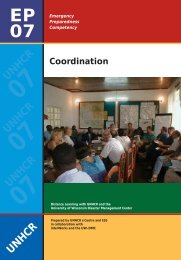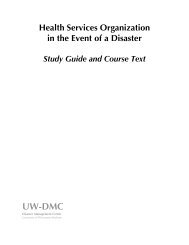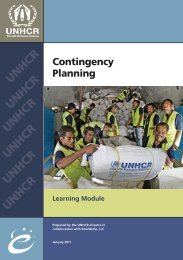Managing External Relations - Disaster Management Center ...
Managing External Relations - Disaster Management Center ...
Managing External Relations - Disaster Management Center ...
You also want an ePaper? Increase the reach of your titles
YUMPU automatically turns print PDFs into web optimized ePapers that Google loves.
EP<br />
04<br />
44<br />
<strong>Managing</strong> <strong>External</strong> <strong>Relations</strong><br />
UNHCR staff must seek to understand the role of the military and work with military staff in<br />
a co-ordinated manner. UNHCR has produced two training modules that provide important insights<br />
for UNHCR and military staff working together. These are: ‘A UNHCR Handbook for the Military on<br />
Humanitarian Operations’ and ‘Working with the Military’ (both published in January 1995)<br />
Religious Organisations<br />
Local religious institutions may be able to serve as excellent sources of information particularly<br />
regarding local conditions. They may also offer other resources such as a transportation network or<br />
schooling facilities. In some operations, religious institutions may serve as implementing partners.<br />
UN Co-ordination in Emergencies<br />
The UNHCR Handbook for Emergencies (2nd edition) describes co-ordination of specific refugee<br />
emergencies as well as the wider category of emergencies (which typically also involves refugees)<br />
known as complex emergencies. Complex emergencies typically involve large scale humanitarian<br />
crises where:<br />
♦ Civilian populations are besieged and/or displaced<br />
♦ The required response transcends the scale or mandate of any one organisation<br />
♦ Parties to the conflict actively impede humanitarian aid<br />
♦ Humanitarian assistance relief workers are placed in situations of high personal risk,<br />
including situations where relief workers are specifically targeted<br />
Co-ordination of the UN Response in Refugee Emergencies<br />
Within the the UN system the responsibility for refugees lies with UNHCR.<br />
Therefore, when there is a refugee emergency, UNHCR is the UN organization<br />
responsible for coordinating the response of the UN system to the emergency.<br />
—UNHCR Handbook for Emergencies, 1999, 2nd edition<br />
Co-ordination of the UN Response to Complex Emergencies<br />
In an emergency, the UN Resident Coordinator usually acts as the Humanitarian Coordinator and is a<br />
valuable source of information, advice and assistance. The UNHCR Representative must keep the<br />
Resident Coordinator well briefed on UNHCR operations and should participate in all inter-agency<br />
meetings to increase mutual understanding and co-ordination at the country level.<br />
UNHCR may be assigned as the lead agency in certain circumstances. Where UNHCR is the lead<br />
agency, it must conduct frequent technical meetings with representatives from governments, other<br />
UN organisations, NGOs and other agencies. Close liaison with the UNDP Representative is also<br />
needed to ensure co-ordination between development and emergency inputs. The refugees, the local<br />
population, military forces, and other institutions, such as religious organisations, are important<br />
collaborators.<br />
There are typically four model structures or options for the co-ordination of the emergency<br />
response. These are generally referred to as:<br />
♦ Lead Agency model<br />
♦ Resident Coordinator model<br />
♦ Humanitarian Coordinator model<br />
♦ Regional Humanitarian Coordinator model








